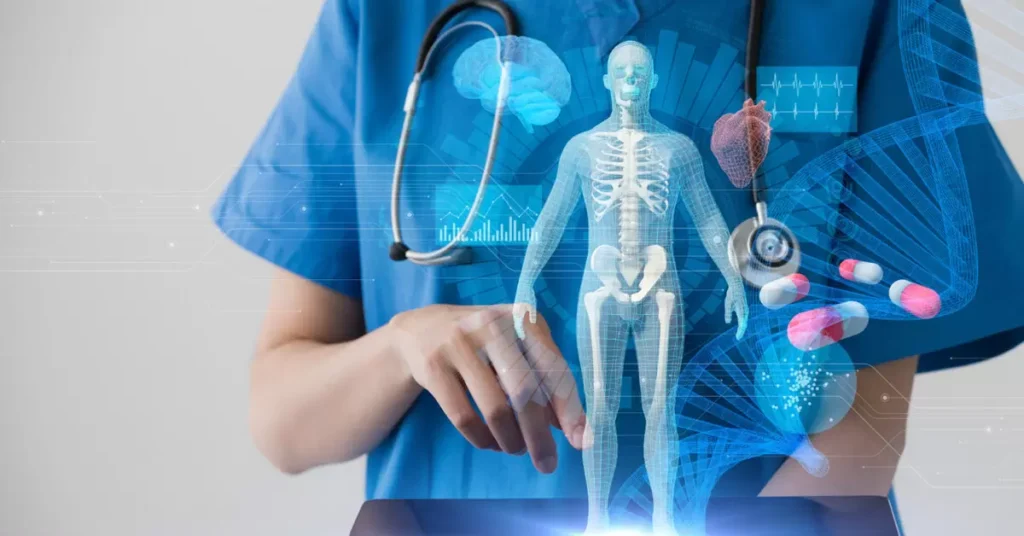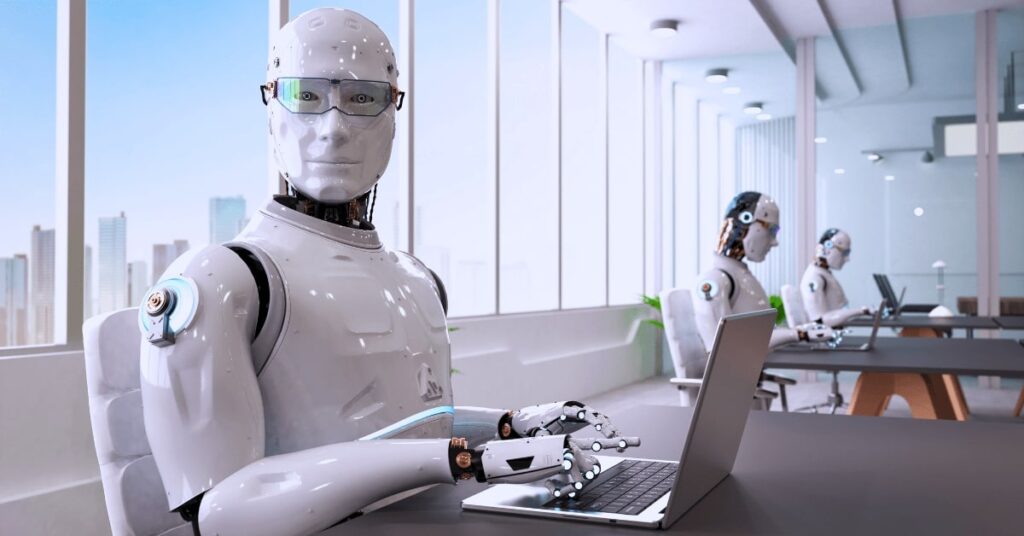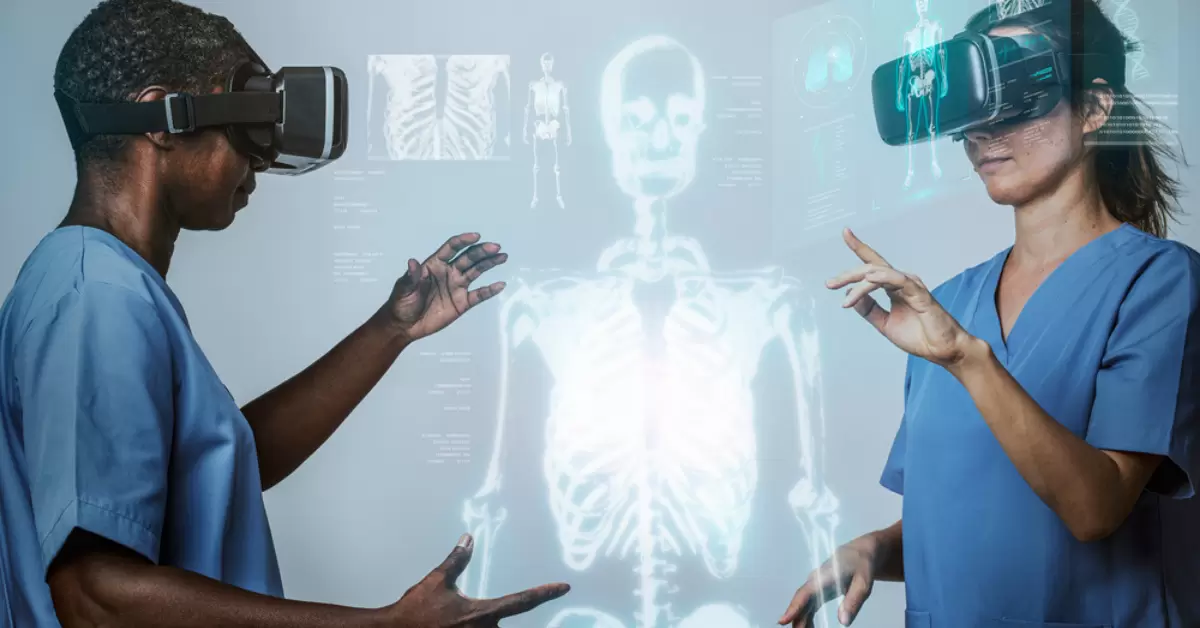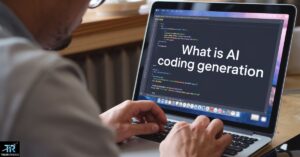In the changing world of healthcare today there is a technology that is set to transform how we think about medical care; artificial intelligence (AI). AI is changing the face of medicine by improving detection of diseases providing diagnoses tailoring treatment plans to individuals and speeding up the process of discovering new drugs. This technology offers hope, for improved results and an elevated level of care, on a scale.
What is Artificial Intelligence in Healthcare?
In the realm of healthcare intelligence involves the utilization of computer systems to analyze extensive data sets identify patterns and offer insights that complement human expertise. This includes a range of methods such, as machine learning, where algorithms are trained on data to make forecasts or decisions and deep learning which employs networks to simulate how the human brain processes information.
These robust AI capabilities are being applied in healthcare scenarios from interpreting scans and forecasting disease probabilities to suggesting individualized treatment strategies and expediting the creation of new medications. The primary advantages of AI, in this field encompass;
- Faster Analysis: AI systems can process massive datasets exponentially quicker than humans, enabling real-time decision-making.
- Reduced Errors: By minimizing human biases and fatigue, AI can help catch mistakes and improve diagnostic accuracy.
- Personalization: AI can analyze an individual’s unique genetic makeup, lifestyle factors, and medical history to tailor treatments for optimal effectiveness and minimal side effects.
As Dr. Eric Topol, a renowned physician-scientist and author, aptly stated, “AI has the potential to revolutionize medicine, to make it more accurate, more precise, and lower cost.”
Early Detection & Accurate Diagnosis

AI has shown potential, in healthcare by helping identify diseases and providing precise diagnoses. Through analyzing images like X rays CT scans and MRIs AI algorithms can detect subtle patterns and irregularities that might go unnoticed, by human observers.
For instance, researchers at Stanford University developed an AI system that can detect breast cancer from mammograms with greater accuracy than radiologists. Similarly, Google’s AI model has proven highly effective in diagnosing diabetic retinopathy, a leading cause of blindness, by analyzing retinal images.
In one remarkable case, an AI system developed by ForeSee Medical helped diagnose a rare and life-threatening condition in a patient whose symptoms had baffled doctors for years. By analyzing the patient’s medical records, the AI identified a pattern consistent with Castleman disease, a rare lymph node disorder, prompting further testing and the correct diagnosis.
The AI system’s ability to connect the dots and identify a potential diagnosis that had eluded human experts for years is a testament to the power of this technology, said Dr. Jennifer Wong, the patient’s physician.
Recommended Post: The Power of Artificial Intelligence in Healthcare
Personalized & Precise Treatment Planning
Beyond diagnosis, AI is also proving invaluable in tailoring treatment plans to individual patients’ unique characteristics and needs. By analyzing vast datasets encompassing factors like genetics, lifestyle, and medical history, AI algorithms can recommend personalized therapies with greater precision and effectiveness.
For example, researchers at Harvard developed an AI system that can analyze a patient’s tumor genetic profile and medical data to recommend the most effective drug combinations and dosages, minimizing side effects and improving outcomes.
In another case study, ForeSee Medical’s AI platform helped optimize treatment for a cancer patient by identifying the ideal drug regimen based on their specific tumor characteristics and genomic data. This personalized approach resulted in a significant reduction in tumor size and improved quality of life for the patient.
| Treatment Approach | Outcome |
| Standard Chemotherapy | Moderate tumor reduction, significant side effects |
| AI-Guided Personalized Therapy | Substantial tumor reduction, fewer side effects |
As Dr. Wong explains, “By tailoring the treatment plan to the individual patient’s unique biology, AI can help us achieve better outcomes while minimizing the harmful side effects often associated with traditional therapies.”
Accelerating Drug Discovery & Development

Another groundbreaking application of AI in healthcare is its potential to accelerate the notoriously slow and costly process of drug discovery and development. By leveraging AI’s ability to model and screen millions of potential drug compounds and their interactions, researchers can identify promising candidates more efficiently.
One notable example is the AI-aided discovery of a new drug for the rare and life-threatening condition known as ALS (amyotrophic lateral sclerosis) or Lou Gehrig’s disease. Researchers at Harvard and MIT used an AI platform to virtually screen over a billion drug-like compounds, ultimately identifying and validating a promising new candidate that could slow the progression of ALS.
“This AI-driven approach could revolutionize the way we discover new drugs, dramatically reducing the time and cost associated with traditional methods,” said Dr. Sarah Green, a lead researcher on the project.
In addition to drug discovery, AI is also being used to optimize clinical trials, streamline regulatory processes, and even predict potential side effects or adverse reactions based on a drug’s molecular structure and interactions.
Challenges & Limitations
While the potential of AI in healthcare is undeniably promising, there are also significant challenges and limitations that must be addressed. One major concern is the quality and completeness of the data used to train AI models, as biases or gaps in the data can lead to inaccurate or biased outcomes.
Privacy and security are also critical issues, as AI systems in healthcare may handle sensitive patient data, raising concerns about data breaches, misuse, or unauthorized access. Robust safeguards and strict data governance protocols are essential.
Another challenge is the lack of transparency and interpretability in some AI systems, often referred to as the “black box” problem. If an AI model makes a recommendation or decision, but the reasoning behind it is opaque, it can be difficult for healthcare professionals to validate or trust the output.
Furthermore, there are significant regulatory hurdles and validation processes required before AI systems can be widely adopted in clinical settings. Ensuring the safety, efficacy, and reliability of AI technologies in healthcare is paramount.
Despite these challenges, many experts believe the benefits of AI in healthcare outweigh the risks, as long as these issues are thoughtfully addressed and AI is implemented with appropriate human oversight and governance.
The Future of AI in Healthcare

As AI continues to advance and mature, its potential to transform healthcare is vast. Rather than replacing human doctors and healthcare professionals, AI is poised to augment their capabilities, elevating the standard of care and democratizing access to high-quality medical expertise.
Imagine a future where AI systems can seamlessly analyze your medical history, genetic data, and lifestyle factors, then recommend personalized preventive measures and treatments tailored to your unique needs. Early detection of diseases could become the norm, and new life-saving drugs could be developed exponentially faster, saving countless lives.
Of course, realizing this vision will require ongoing collaboration between researchers, clinicians, policymakers, and the public to ensure AI is developed and deployed responsibly and ethically in healthcare settings.
But the potential rewards are immense – a future where AI empowers healthcare professionals to provide more accurate diagnoses, more effective treatments, and ultimately, better health outcomes for all.
Frequently Asked Questions
What is Artificial Intelligence (AI)?
Artificial Intelligence refers to the ability of machines or computer systems to perform tasks that typically require human intelligence, such as learning, reasoning, problem-solving, and decision-making.
How can AI be used in healthcare?
AI can be applied in various areas of healthcare, including disease diagnosis, drug discovery, medical imaging analysis, patient monitoring, and personalized treatment recommendations.
What are some examples of AI applications in healthcare?
Examples include using machine learning algorithms to analyze medical images and detect potential diseases, natural language processing to understand and extract information from electronic health records, and predictive analytics to identify patients at risk of developing certain conditions.
What are the benefits of using AI in healthcare?
AI can help improve diagnostic accuracy, enhance treatment effectiveness, reduce healthcare costs, and enable more personalized and preventive care.
Are there any concerns or risks associated with AI in healthcare?
Potential concerns include data privacy and security issues, the need for strict regulatory oversight, the risk of biased or incorrect AI decisions, and the potential for job displacement in certain healthcare roles.
How can healthcare professionals prepare for the integration of AI?
Healthcare professionals can stay updated on AI developments, receive training in data analytics and AI interpretability, and collaborate with AI experts to ensure effective and ethical implementation of AI solutions.
Will AI replace human healthcare professionals?
AI is not designed to replace human healthcare professionals entirely but rather to augment and assist them in their roles, allowing them to focus on more complex tasks and personalized patient interactions.
Conclusion
In the end, artificial intelligence (AI) is becoming very important in the healthcare field. AI uses smart computer systems to learn from large amounts of data. This technology can help doctors and nurses in many ways.
AI can look at X-rays, MRI scans and other medical images to find diseases earlier than humans can. It can study a patient’s genetics and health history to recommend the best treatments for their specific needs. AI can also help create new medicines faster by testing millions of drug options.
While there are some challenges like data privacy and checking AI for mistakes, the benefits could make healthcare much better. AI may allow more people to get excellent, personalized medical care. It could lead to faster disease discovery, smarter treatment plans, and lifesaving new drugs.
The use of AI in healthcare is just getting started. As the technology keeps improving, it will help doctors provide better care and give patients a healthier future. AI has amazing potential to make positive changes in the medical world.











